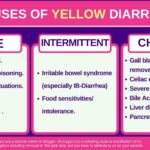The Urge to Poop But Only Mucus Comes out (Proctitis): Causes Explained.
Our content is not intended nor recommended as a substitute for medical advice by your doctor. Use for informational purposes only.
The severe urge with only mucus coming out is usually a sign of proctitis (rectal inflammation). The common causes of proctitis are dysentery, Sexually-transmitted diseases of the anorectal canal, Inflammatory bowel diseases (IBD), anal fissures, and inflamed hemorrhoids.
Common causes of the urge to poop with mucus only coming out:
- Dysentery, and some other foodborne illnesses.
- Sexually transmitted diseases of the anorectum.
- Inflammatory Bowel Diseases such as Crohn’s and Ulcerative colitis.
- Rectaliulcers.
- Anorectal abscesses or fistulas.
- Antibiotic-associated colitis and proctitis.
- Severe forms of food allergy or intolerance.
- Anorectal cancer.
- Radiation colitis or proctitis.
- Diversion colitis.
- Irritable bowel syndrome (especially the diarrhea-predominant type).
1- Dysentry (especially Bacillary dysentery):
Dysentery is the passage of blood, mucus, or both blood and mucus with stool. In severe cases of dysentery, mucus or blood comes out without stool. The condition is usually accompanied by severe urgency to poop and frequency.
Dysentery (especially bacillary dysentery) is the most common cause of acute onset proctitis. Having a recent onset urgency to poop with only mucus coming out is commonly due to dysentery.
Symptoms (How to suspect):
- The onset is acute: if you have a recurrent or chronic mucus-only stool, then dysentery is unlikely.
- Diarrhea may present at first, then only mucus or blood comes out.
- Tenesmus: intense urgency to poop, only a small amount of mucus comes out. This is followed by a sense of incomplete evacuation.
- Intense abdominal pain (usually localized in the lower abdomen).
- Fever: usually acute onset, and high grade.
- Nausea, vomiting, or both. (rarely present with bacillary dysentery).
Another common cause of dysentery is amoebic dysentery. Amoebic dysentery is caused by a protozoan called “Entamoeba Histolytica”.
However, Severe proctitis with an intense urgency to poop and mucus only coming out is way more common with bacillary dysentery. And it rarely occurs with amoebic dysentery.
Treatment: (reference)
- Dysentery causing severe proctitis with urgency, mucus, or blood coming out instead of stool usually requires medical attention.
- Seeking medical help is especially important if you have high-grade fever, vomiting, or intolerable abdominal pain.
- Drinking lots of fluid to compensate for water loss is very vital.
- Eat a BRAT diet: bananas, rice, apple sauce, and toast.
- Your doctor may require a stool sample to determine the causative organism and prescribe a suitable treatment.
- Your doctor may prescribe some anti-diarrheal medications such as Loperamide (Imodium), or diphenoxylate (Lomotil).
- If the symptoms are severe enough, your doctor may prescribe antibiotics such as levofloxacin, ciprofloxacin, Azithromycin, or ceftriaxone for few days (usually 3-5 days).
- The antibiotics can be given empirically or according to a culture and sensitivity test.
Related: Pooping mucus only: causes explained.
2- Other types of foodborne illnesses that can cause proctitis.
Some foodborne illnesses can cause dysentery and proctitis other than bacillary dysentery.
Foodborne illnesses (AKA food poisoning) occur due to a wide variety of organisms. From which, some are known to cause proctitis. which is manifested by an intense urge to poop, with only mucus or blood coming out.
Common causes: (ref)
- Salmonella (Typhoid Fever).
- E-coli (Shiga toxin-producing strains and entero-invasive strains).
- Clostroides difficile colitis and proctitis.
- Cytomegalovirus colitis and proctitis.
The symptoms are usually milder than bacillary dysentery but may become severe especially if you are immunocompromised.
3- Sexually transmitted diseases (STDs) causing proctitis.
Recent sexual practice involving the anorectal area followed by rectal discharge (mucus only coming out with urgency) may indicate a sexually transmitted disease.
Having anal sex activity with an infected partner can lead to severe proctitis.
Unfortunately, Your partner doesn’t have to be symptomatic to transmit the infection to you.
Common causes of STD causing proctitis:
- Anorectal gonorrhea.
- Chlamydia infection: chlamydia infection of the anorectum commonly causes a severe urge to poop and only mucus comes out.
- Syphilis: causes painful ulcers in the anorectum with the discharge of pus and mucus.
- Sexually transmitted campylobacter Jejuni: causes rectal ulcer, mucus-only diarrhea, intense urgency, and abdominal cramps.
Symptoms of STDs as a cause of proctitis:
- Analipain.
- Tenesmus: a sense of complete evacuation of the rectum after defecation.
- Recent history of anal sexual activities (even with a partner without symptoms).
- Urgency: sudden and intense urge to poop.
- Frequency: frequent attacks of stool urgency with nothing coming out or only mucus or pus.
- Rectal discharge: pus, mucus, blood, or mixed discharge.
- Fever may occur.
- Other genital symptoms may be also present such as ulcers or abnormal discharge.
Consult your doctor or an STD specialist immediately if you suspect you have an STD.
4- Inflammatory Bowel Disease (IBD): such as Crohn’s or ulcerative colitis.
Inflammatory bowel diseases are characterized by inflammation and ulceration in the lining of the digestive tract.
Its exact cause is still unknown, but scientists think it is due to a defect in the immune system.
The Term IBD is used to describe 2 distinct conditions:
- Ulcerative colitis: inflammation and ulceration involving the large intestine only (colon, sigmoid, and anorectum).
- Crohn’s disease: inflammation and ulcers can occur at any part of the digestive tract from the mouth to the anal canal.
Undiagnosed or untreated IBD can present with proctitis. This can cause an intense urge to poop and mucus-only rectal discharge.
Symptoms suggestive of IBD:
- Persistent and unexplained diarrhea (sometimes it is mucus-only diarrhea).
- persistent or recurrent abdominal pain.
- Mucus or blood with stool.
- Tenesmus and urgency.
- weight loss.
- Fatigue.
- Fever.
The course of symptoms is usually prolonged over a period of weeks to years. You can’t diagnose IBD by yourself. Medical help to get diagnosed and treated is necessary.
5- Rectaloorianal ulcers.
The rectal ulcer is a breakdown in the lining of your rectum. It can occur due to a variety of causes such as infections, tumors, and others (some of the causes were mentioned above).
Rectaliulcers usually present with proctitis (tenesmus, urgency, mucus, or bloody discharge).
Common causes of rectal ulcers:
- IBD (Crohn’s and ulcerative colitis).
- Severe constipation.
- Ulcerated rectal or anal cancer.
- Radiotherapy of the anorectum.
- Solitary Rectal Ulcer Syndrome (SRUS): a rare disease characterized by rectal ulcer due to an unclear cause.
Symptoms of rectal ulcers:
- Anal or rectal pain.
- Painful bowel movements.
- Rectal discharge: mucus, blood, pus, or mixed.
- Tenesmus: A sense of incomplete evacuation after bowel movements (usually preceded by an urgency to poop).
- Unfortunately, the symptoms of rectal ulcers are difficult to differentiate from other causes of proctitis.
- The definite diagnosis is done by local examination by your doctor or via colonoscopy.
6- Anorectal abscess.
Rectaloor anal abscesses are sacs of infected tissue in the wall of the anorectum, filled with pus.
An anorectal abscess can lead to symptoms of proctitis with urgency and mucus-only poop.
Symptoms of anorectal abscesses:
- Swelling at the anus. It is usually very painful.
- Rectalidischarge.
- Fever, body aches.
- Symptoms of proctitis: tenesmus, urgency, mucus, or pus discharge.
- Very painful bowel movements (constipation may develop as a result of fear from defecation).
7- Antibiotic-associated colitis.
We use antibiotics to kill harmful bacteria. However, it can also kill the beneficial gut microbes in the intestines.
The loss of commensal (beneficial) bacteria will allow other harmful bacteria to flare up.
Antibiotic use can lead to a severe form of inflammation of the colon called “Clostroides difficile colitis”.
Common offending antibiotics:
Most antibiotics can potentially lead to such a condition. But stronger broad-spectrum antibiotics are more likely to do so.
- Penicillins.
- Ceftriaxone.
- Ciprofloxacin and levofloxacin.
- Using antibiotic combinations.
call your doctor immediately if you have severe urgency to poop and only mucus coming after a few days of antibiotics.
8-Anal cancer.
The presence of rectal or anal cancer can lead to the symptoms of proctitis with urgency to poop, mucus, or bloody discharge.
Risk factors include:
- Usually affects older ages (but also can occur in teenagers and younger adults).
- A high-protein diet (especially red meat).
- Lack of physical activity.
- Low fiber diet.
- Smoking and alcohol.
- Obesity.
- Risk factors for anal cancer: Multiple sexual partners, anal intercourse, Human Papillomavirus.
Symptoms suggestive of anal cancers:
- Change in bowel movements (diarrhea or constipation).
- Dark or bright red blood in the stool.
- Narrow stool.
- A sense of mass or incomplete evacuation after bowel movements.
- Ulcerated tumor mass may cause inflammation and mucus discharge with an intense urgency to poop.
- Unexplained weight loss.
- Unexplained fatigue and anemia.
- Unexplained fever.
9- Other (less common) causes:
- Severe Prolonged IBS-Diarrhea.
Irritable bowel syndrome with prolonged diarrhea can lead to proctitis with urgency and mucus discharge. IBS alone can lead to mucus in stool. - Diverticulitis.
Inflamed sack-like lesions inside the colon. It is more common with older ages. - Radiation colitis/proctitis.
Radiotherapy in the anorectal area can lead to severe proctitis. - Diversion colitis/proctitis.
after diversion of the stool to an opening in the abdominal wall (colostomy), the empty (distant) part of the colon and the rectum may inflame and cause such symptoms. Learn more. - Eosinophilic proctitis.
It is an allergic inflammation of the rectal wall with tenesmus, urgency, and mucus-only poop. - Severe forms of food intolerance and allergy.
MORE: Why Does My Poop Feel Sharp? 7 Causes Explained In-depth.
- Fact-checked
- Written By A Doctor

Related Posts:
- White Mucus in Poop: 7 Causes Explained.
- Pooping mucus only: 12 Causes Explained (Dr. Farahat).
- Mucus In Stool With IBS: Causes, Different Colors, &…
- Clear White Mucus In stool: 6 Causes (Doctor Explains).
- Do Bananas Make you Poop? (GI Doctor Explains).
- 3 Reasons Why Apple Will Make You Poop (GI Doctor Explains).






